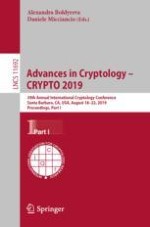2019 | OriginalPaper | Buchkapitel
Algebraic Techniques for Short(er) Exact Lattice-Based Zero-Knowledge Proofs
verfasst von : Jonathan Bootle, Vadim Lyubashevsky, Gregor Seiler
Erschienen in: Advances in Cryptology – CRYPTO 2019
Aktivieren Sie unsere intelligente Suche, um passende Fachinhalte oder Patente zu finden.
Wählen Sie Textabschnitte aus um mit Künstlicher Intelligenz passenden Patente zu finden. powered by
Markieren Sie Textabschnitte, um KI-gestützt weitere passende Inhalte zu finden. powered by
